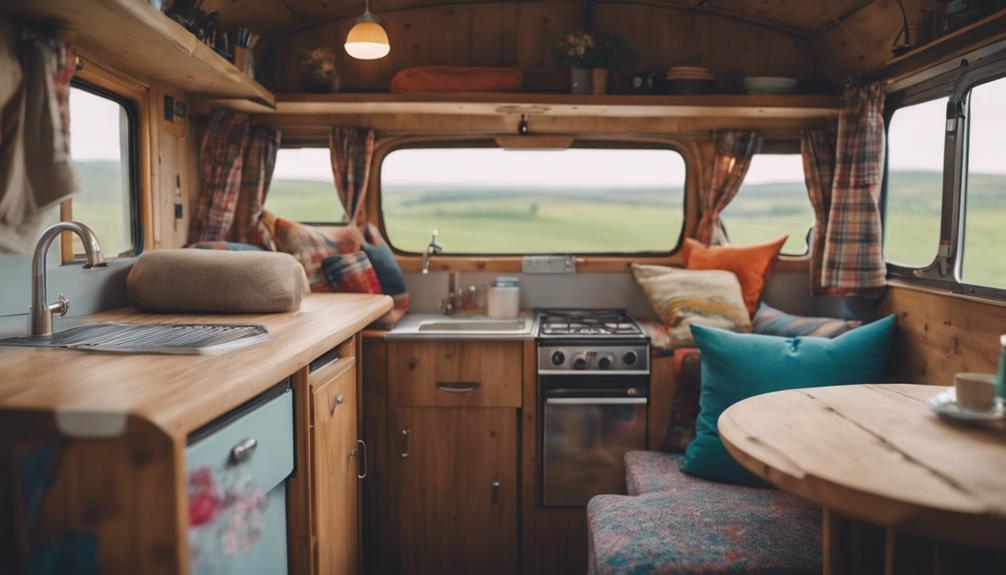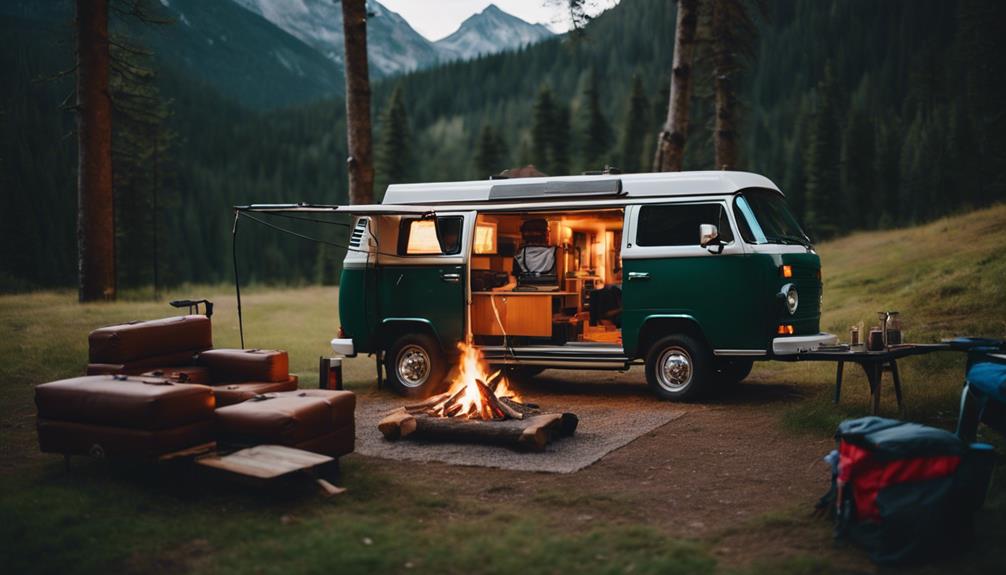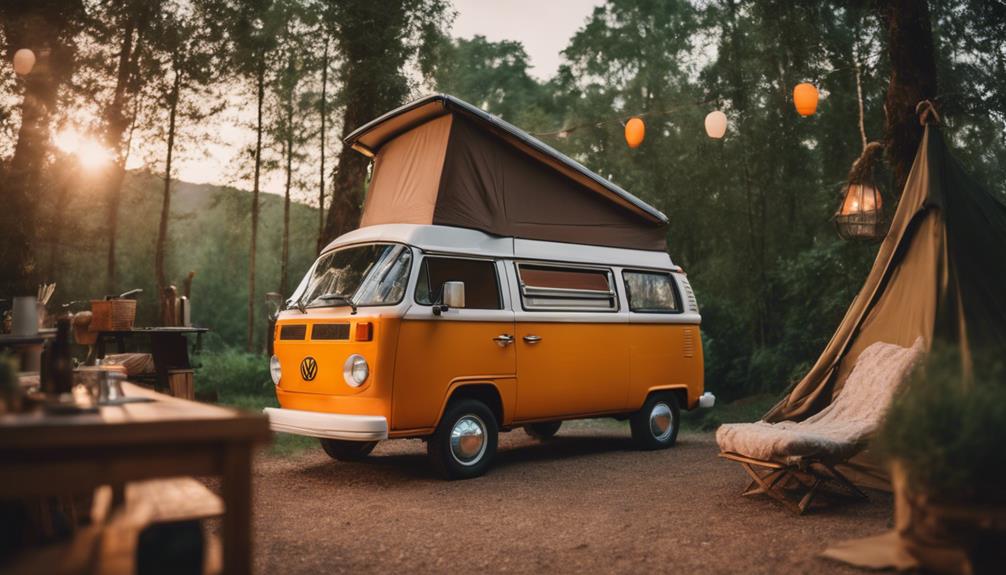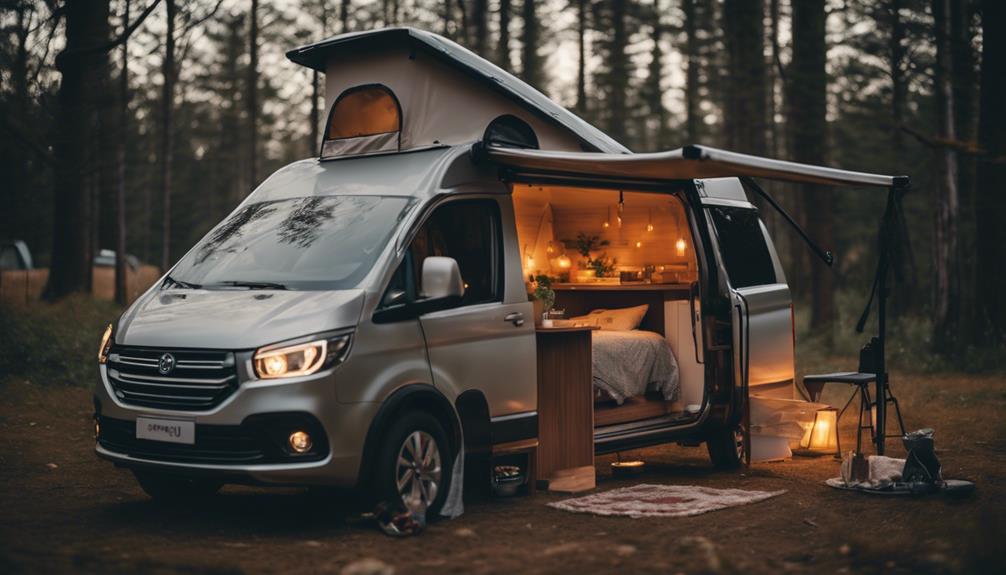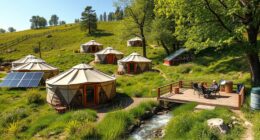Camper conversions in the UK typically range from £5,000 to over £30,000, depending on your needs and choices. For a basic build, you might find prices starting around £1,500 for a DIY project. A professional conversion usually falls between £5,000 and £25,000, with high-end options reaching £40,000. Essential features like kitchens and bathrooms can greatly increase costs. If you're considering eco-friendly options or innovative designs, those will also affect your budget. Understanding these factors will help you make informed decisions about your campervan project, and there's a lot more to explore on this journey.
Introduction
When considering a campervan conversion in the UK, you might find costs ranging from about £5,000 to over £30,000, depending on your specific needs and preferences. Understanding the campervan conversion cost is vital for planning your project effectively. The average van conversion cost typically sits between £5,000 and £25,000, but if you're aiming for a high-end professional conversion, the expenses can soar to around £40,000.
Several factors influence conversion costs, such as the type of van you choose and the quality of materials you want to use. If you opt for a DIY project, you could start with basic features for as low as £1,500, but remember that this may limit your options. Incorporating important features like kitchens and bathrooms will also drive up the overall cost of a van.
It's important to assess the vehicle's condition and factor in labor costs when budgeting. By thoroughly understanding these elements, you can make informed decisions and set a realistic budget for your campervan conversion journey.
Background Information
Campervan conversions are becoming increasingly popular as more people seek adventure and flexibility in their travels.
You've likely noticed a rising demand for eco-friendly options, reflecting a shift in consumer preferences toward sustainable living.
This trend is shaping the market, making it essential to understand the pricing landscape.
Campervan Conversion Popularity Surge
Post-pandemic, a significant surge in campervan conversions has drawn countless enthusiasts seeking flexible travel and outdoor adventures. You might be one of the many who've embraced the van life lifestyle, keen to explore the open road at your own pace. This growing interest has led to a boom in both DIY projects and professional conversion services. Whether you're a seasoned builder or a complete novice, there's ample opportunity to transform a standard van into your dream campervan.
Online communities and social media platforms have played a vital role in this explosion of interest. They provide resources, tips, and inspiration for your conversion journey. You can find everything from how-to guides for DIY conversions to recommendations for reputable professional conversion companies.
As more people recognize the benefits of camper travel, market reports indicate a steady rise in rental campervans, further showcasing the growing acceptance of this lifestyle as a viable vacation option. With so many options available, you're sure to find the perfect fit for your adventure-seeking spirit.
Embrace the campervan conversion trend and start planning your next getaway today!
Rising Demand for Eco-Friendly Conversions
A growing number of travelers are seeking eco-friendly campervan conversions, driven by a desire for sustainable travel options. You're likely to notice that many of these conversions use innovative materials like bamboo and recycled plastics, reducing environmental impact. With rising awareness about the effects of travel on our planet, eco-friendly conversions are becoming more appealing.
Incorporating solar panels and lithium batteries is now standard in many models, allowing you to power your adventures without relying on fossil fuels. This shift towards energy-efficient technologies not only enhances your travel experience but also aligns with eco-conscious living. As you consider conversion costs, remember that investing in these green features can lead to long-term savings on energy and maintenance.
Interestingly, market trends show that up to 30% of new campervan buyers prioritize eco-friendly features when deciding on conversions. This reflects a significant shift towards sustainable practices in the van life community. By choosing an eco-friendly conversion, you're not just making a smart financial decision; you're also contributing to a movement that encourages responsible travel and environmental stewardship.
Eco-Friendly Conversion Innovations
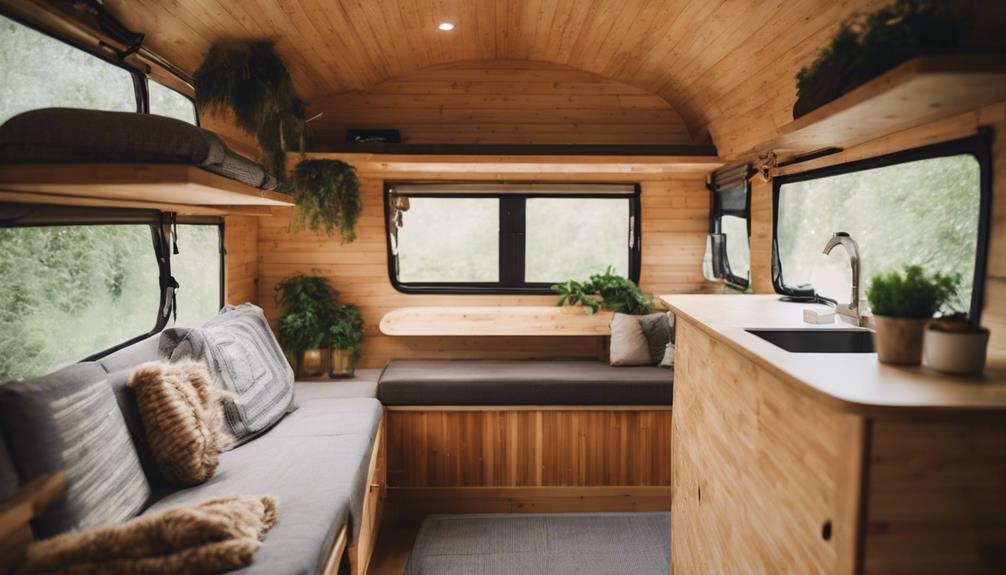
When you're considering an eco-friendly camper conversion, think about incorporating sustainable materials like bamboo and recycled insulation.
You'll also want to explore innovative energy-efficient appliances that can power your adventures while minimizing your carbon footprint.
Sustainable Materials in Conversions
Sustainable materials are becoming essential in campervan conversions, with options like bamboo and reclaimed wood considerably reducing environmental impact. By choosing these sustainable materials, you're not only making an eco-friendly choice but also contributing to a healthier planet.
During the conversion process, consider incorporating low-VOC paints and finishes to guarantee better indoor air quality and minimize harmful emissions. Many builders are now utilizing lightweight materials that enhance fuel efficiency, which can help offset some of the costs associated with your conversion.
Plus, using these eco-friendly options often leads to long-term savings, as they can improve the overall durability and comfort of your campervan. Innovations in solar technology, like flexible solar panels, can also be integrated into your camper conversion. These systems allow you to power your appliances while reducing reliance on fossil fuels, further enhancing your eco-friendly approach.
As consumer demand rises, there's been a notable increase in the use of sustainable materials, with a 30% uptick in recent years. This shift not only reflects growing environmental responsibility but also aligns with your desire for a unique and conscious travel experience.
Innovative Energy-Efficient Appliances
Innovative energy-efficient appliances transform campervan conversions, allowing you to enjoy modern comforts while minimizing your environmental footprint. By incorporating energy-efficient appliances, like induction cooktops and compact refrigerators, you can notably reduce power consumption, making your camper ideal for off-grid living.
Integrating solar panels and high-capacity lithium batteries into your setup enables sustainable energy use, reducing reliance on traditional power sources. This combination not only powers your appliances but also gives you the freedom to explore remote locations without worry.
Using eco-friendly materials, such as sustainably sourced wood and recycled insulation, further enhances your camper's environmental credentials while ensuring durability and high quality. Additionally, innovative composting toilets and water-saving fixtures help minimize water usage and improve waste management, making your camper even more sustainable.
Adopting smart technology, like energy monitoring systems, allows you to track and optimize your energy consumption, ensuring efficient power use on your travels. By choosing these innovations, you create a comfortable, eco-friendly living space that aligns with your values while enjoying the great outdoors.
Cost-Benefit Evaluation
When you're considering a camper conversion, it's important to weigh the advantages and disadvantages carefully.
Understanding industry expert insights and comparing market trends can help you make an informed decision.
Advantages and Disadvantages Overview
Converting a campervan offers a mix of advantages and disadvantages that can greatly impact your budget and overall satisfaction with the project. One of the primary benefits is the ability to tailor custom conversions to fit your specific needs, allowing you to prioritize crucial features like kitchen appliances and storage.
However, this flexibility often comes at a higher cost, especially if you choose to work with a conversion company known for quality work.
On the other hand, DIY conversions can considerably reduce labor costs, sometimes saving you up to 50%. Yet, this approach demands substantial effort, skill, and time, which can lead to budget overruns if not managed properly. It's vital to stay focused on your priorities to avoid overspending on luxury items that may not be necessary.
Another aspect to contemplate is resale value; well-maintained campervan conversions usually fetch a higher price than standard vehicles, potentially offsetting your initial investment costs.
Ultimately, evaluating these advantages and disadvantages will help you decide the best route for your camper conversion project while keeping your budget in check.
Industry Expert Insights
Understanding the financial implications of your camper conversion can help you make informed decisions that balance quality and budget.
When considering campervan conversions, it's essential to know how much you're willing to spend. High-quality conversions in the UK typically range from £35,000 to £45,000, especially if you're looking for luxury conversion features like showers and hot water systems. On the other hand, DIY conversions can start as low as £900 but can still reach up to £2,000 if you're adding essential features.
To manage costs effectively, prioritize essential features and avoid unnecessary luxuries that can inflate your budget. The choice of a reliable van, such as the Fiat Ducato or Peugeot Boxer, can also impact the overall conversion costs. These models are popular for their affordability and dependability.
If upfront costs are a concern, consider financing options like personal loans or payment plans. This way, you can spread out the expenses associated with custom builds, making campervan conversions more accessible.
Balancing quality with your budget will lead to a satisfying investment in your future adventures.
Market Trends Comparison
Campervan conversions are becoming increasingly popular, with rising demand pushing average costs between £5,000 and £25,000, while high-end models can easily exceed £30,000.
As you explore your options, you'll notice a significant trend towards DIY conversions. Many enthusiasts are opting to take on projects themselves, allowing them to save up to 50% on labor costs. This not only makes camper van conversions more affordable but also gives you a chance to personalize your space.
Additionally, market trends indicate a shift towards eco-friendly materials in camper conversions. Sustainable living practices are gaining traction, and incorporating these materials into your build can enhance the appeal and market value of your camper.
The popularity of van life culture has also led to innovative designs that prioritize functionality and comfort, making your investment more worthwhile.
If financing options are a concern, you'll find various personal loans and payment plans that can make this lifestyle choice more accessible.
To summarize, while costs may vary, the benefits of investing in a camper van conversion are substantial, especially when considering the growing market trends and financing opportunities available to you.
Budgeting for Eco-Friendly Materials
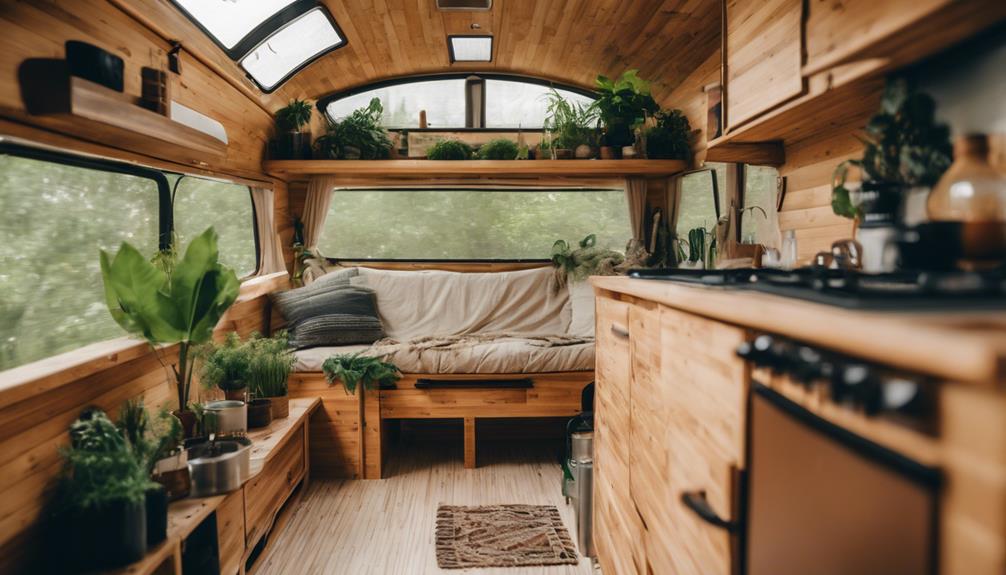
When budgeting for eco-friendly materials in your camper conversion, it's essential to take into account both initial costs and long-term savings.
You can explore sustainable sourcing strategies that not only fit your budget but also reduce environmental impact.
Eco-Friendly Material Budgeting Tips
Budgeting for eco-friendly materials can seem challenging, but smart choices and research can help you stay within your limits while making a positive impact on the environment.
Start by exploring sustainable options like reclaimed wood and natural insulation, which can often reduce your overall budget while minimizing your ecological footprint.
Investing in solar panels and energy-efficient appliances is another smart move. Although there might be a higher initial cost, these features can lead to significant savings on energy bills in the long run. They're particularly beneficial in a camper conversion, as they make your regular van more self-sufficient and comfortable.
Don't forget to research suppliers specializing in eco-friendly materials. You might be surprised at the competitive pricing available, which can help you stick to your budget.
Also, consider using materials like bamboo and recycled plastics; they not only enhance the aesthetics of your camper but also offer durability that stands the test of time.
Eco-Friendly Sourcing Strategies
Finding the right sources for eco-friendly materials not only helps you stay within budget but also supports sustainable practices in your camper conversion project.
Start by considering eco-friendly materials like bamboo and reclaimed wood, which can cost between £10 and £30 per square meter. For thermal insulation, look into sustainable insulation options such as sheep's wool or recycled denim, priced around £20 to £50 per roll.
You can save considerably by utilizing second-hand appliances or upcycled furnishings, potentially cutting costs by up to 70% compared to new eco-friendly options. Researching local suppliers can further enhance your sustainability goals while reducing transportation emissions and possibly lowering material costs.
Investing in energy-efficient systems, like solar panels and LED lighting, might require an upfront commitment of £1,000 to £3,000. However, these investments pay off with long-term savings on energy bills and a reduced carbon footprint.
What Factors Determine the Cost of a Camper Conversion in the UK?
The camper conversion cost UK can be influenced by several factors, such as the size of the vehicle, the materials used, and the complexity of the conversion. Custom features and amenities can also impact the overall cost. Additionally, labor and location can play a role in determining the final price.
Conclusion
Ultimately, understanding the costs and benefits of camper conversions in the UK can help you make an informed decision that suits your lifestyle and budget.
When evaluating the cost of your van, consider your needs and how they align with various layout options. Whether you opt for a fully professional conversion or a DIY project, the expenses can vary dramatically—ranging from around £500 for basic setups to over £40,000 for luxurious designs.
Think about essential features versus luxury additions, as these will considerably impact your overall budget. A well-executed camper van conversion can save you money in the long run, potentially cutting living expenses by at least £600 each month compared to traditional renting.
While pre-built campervans can be more budget-friendly and often come with extra features, custom conversions allow for tailored designs that meet your specific requirements.
Frequently Asked Questions
How Much Does It Cost to Convert a Camper in the Uk?
Converting a camper in the UK can cost anywhere from £1,500 for a DIY project to over £35,000 for luxury professional builds. Your choices in materials and features will greatly impact the final price.
Is It Cheaper to Buy a Campervan or Convert a Van Uk?
It's often cheaper to convert a van than buy a campervan. You can customize it exactly how you want, saving money while creating a space tailored to your needs, unlike pre-built models with limited options.
How Much Does It Cost to Insulate a Van in the Uk?
Insulating your van in the UK usually costs between £300 and £1,000, depending on materials and size. DIY options can save you money, while professional installation provides enhanced effectiveness but at a higher price.
How Much Does It Cost to Convert a Transit to a Campervan?
Converting a Transit to a campervan typically costs between £5,000 and £30,000. Your expenses will depend on the features, materials, and whether you choose a DIY approach or hire professionals for the job.
Conclusion
To sum up, investing in a camper conversion can be a rewarding experience, especially when you prioritize eco-friendly materials.
By understanding the costs involved and planning your budget wisely, you can create a sustainable living space that fits your needs.
Embracing innovative solutions not only benefits the environment but can also enhance your travel adventures.
So, whether you're hitting the road for weekends or extended trips, you'll enjoy the journey knowing you made a responsible choice.

